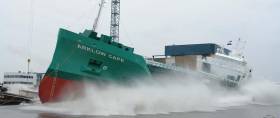Displaying items by tag: Fourth 'C' class launch
Arklow Clan Yet to Christen Fourth Launched Newbuild 'C' Class
#DoubleEvents - On the same day ICG’s new Irish Ferries cruiseferry had a first steel-plate cutting ceremony held in a German yard, this was in marked contrast to Arklow Shipping having yet another ship launched in neighbouring Netherlands, writes Jehan Ashmore.
Arklow Clan (yard No. 427) an open-hatch decker was launched successfully on Friday at Ferus Smit’s yard in Westerbroek. The newbuild is the fourth 5,200dwt general cargoship built so far in a series of 10 that began with the ‘Cadet’ last year.
Likewise of interim sisters, Arklow Cape and Arklow Castle (see report), the latest newbuild was launched into the waterway with the public having an opportunity to view from the opposite side along the ‘Winschoterdiep’. The launching however was performed without ceremony, as the christening of Arklow Clan is to take place at a later stage.
Last year marked the 50th year of Arklow Shipping Limited following an amalgamation in 1966 of three independent shipowning families. The Tyrrell, Kearon and Hall families all had origins directly in trading auxiliary sailing schooners from the banks of the River Avoca that flows through the Co. Wicklow port.
Arklow Clan is a short-sea trader built from a new design or of the ‘C’ Class series that will each have a maximized hold volume of 220.000 cft and a carrying capacity over 5000 deadweight tons. These characteristics will make this newbuild and sisters still fall under the 3,000 gross tons limit.
The single-hold vessel will be given an 1A iceclass notation and propelled by a 1740 kW MaK engine with a single ducted propeller.
Delivery of Arklow Clan is scheduled for May, the same month in 2018 that was originally announced by ICG/Irish Ferries newbuild for delivery. As reported today, the giant 50,000grt cruiseferry, however will be delivered by FSG Flensburg later in mid-2018.
Returning to Ferus-Smit’s Dutch yard which has been contracted also by ASL for a quartet of small handy-sized bulk-carriers. They will be around 16,500dwt each and with the first pair to be delivered next year.





























































